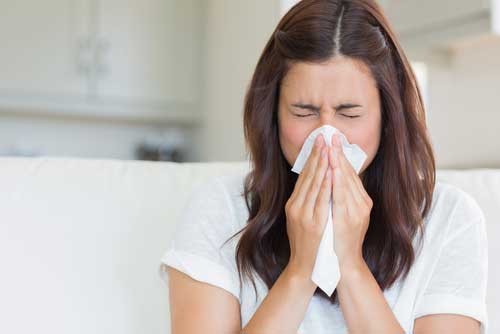There’s one type of nuisance infection that everyone has had at one time or another. Can you guess what it is? If you said “the common cold,” you’re right. Colds spread rapidly from one person to another, and when you get one it can certainly make your life inconvenient for a few days. The average person gets 2 to 4 colds per year, usually in the winter and early spring.
As you might have guessed, the common cold is caused by a virus. A pesky group of viruses called rhinoviruses are responsible for the sniffling, sneezing and dry cough you experience with a cold. Rhinoviruses replicate easily in the mucous membranes that line the inside of your nose. Once planted inside your nose, the virus replicates and produces baby viruses that easily spread to other people when you cough or sneeze. In fact, colds are among the most contagious of viruses.
Certain People Are More Prone Towards Colds
If you’re like most people, you want to keep the cold virus at bay. Conventional wisdom says to wash your hands, avoid others who are sick, get enough sleep and eat a healthy diet to keep your immune system healthy – good advice but certainly not foolproof. Some people are more susceptible to colds than others, but no one knows exactly why.
Now a new study shows there’s something else you can do to lower your risk of colds – keep your nose warm. You might wonder how a warm nose protects against colds. Researchers at Yale University tested rhinoviruses and how they behaved at various temperatures, including normal body temperature. What they found was the virus replicated easily in a cooler environment of 33 degrees Centigrade but not so readily at normal body temperature, around 37 degrees Centigrade.
Cold Isn’t Good for Colds
As mentioned, colds are more common during the winter when the weather is cold. Many experts believe this is because people spend more time indoors where they can expose and be exposed to cold viruses – but this study suggests another factor is at play – nose temperature. Researchers in this experiment believe a cold nose reduces the body’s ability to mount an immune response against cold viruses. That’s important since an effective immune response helps keep cold viruses from setting up an infection, and with a cold nose, you lose that benefit.
The researchers also point out that temperature inside the nasal passages is lower than other parts of the body that are less exposed to the cold air. For example, temperatures are warmer inside the lungs. This higher temperature may explain why colds rarely develop into more serious lung infections. The lungs are warm enough to mount a robust, protective immune response.
What does this mean? When you step outside into the cold during cold season, keep your nose warm by wrapping a scarf around your neck and lower face. A healthy immune system is important for reducing the frequency of colds in the winter and all year round. Here are other tips for fighting winter colds:
Do the obvious stuff
Avoid people who are sick and washing your hands frequently. Keep your fingers away from mucous membranes, including your nose and mouth.
Increase humidity
A study showed 86% of influenza viruses lost their infective powers in an environment of 43% humidity or higher. The same probably applies to cold viruses as well. If you live or work in a dry environment, invest in a humidifier.
Get 7 to 8 hours of sleep nightly
A must-do during cold and influenza season. Lack of sleep raises cortisol, which in turn suppresses your body’s immune response.
Eat a nutrient-rich diet
Low levels of some vitamins and minerals, including vitamin C and zinc, may increase your risk for catching a cold.
Eat more probiotic-rich foods
Enjoy more foods with probiotics like yogurt with active cultures, miso, and other fermented foods. Some, but not all, studies show probiotic bacteria lowers the risk for colds.
Expose your skin to light to increase vitamin D
Vitamin D is important for an effective immune response against viruses of all types. If you live in an area with little direct sunlight during the winter, ask your doctor to check your vitamin D level.
Sip white tea during cold season
Some research shows white tea, a rich source of antioxidants, helps fight viruses and bacteria by enhancing the immune response to these critters. It beats its close cousin, green tea, for keeping viruses in check.
Exercise regularly, but don’t overtrain
Research shows 30 to 60 minutes of exercise daily enhances the body’s immune response, including the response to viruses. Exercise also temporarily increases core body temperature, which may jump-start the immune system. Don’t overdo it though. Overtraining can depress immunity and make you more susceptible to illness. For example, marathon runners are more susceptible to colds the week after running a marathon.
The Bottom Line?
Colds are one of the most common illnesses humans deal with. Fortunately, they don’t last long and rarely lead to complications. Take these steps to keep cold viruses at bay and stay healthy this winter.
References:
BBC News. Health. “Common Colds “Prefers Cold Noses”
NPR News. “Why Some People Evade Colds And Others Don’t”
American Lung Association. “Facts about the Common Cold”
WebMD. “Higher Indoor Humidity Levels Might Slow Flu”
Int J Clin Pharmacol Ther. 2005 Jul;43(7):318-26.
Br J Nutr. 1997;77:59-72.
Am J Clin Nutr. 2007;85:837-844.
Science Daily. “White Tea Beats Green Tea In Fighting Germs”
MedLine Plus. “Exercise and Immunity”
EXOS. “How Exercise Affects Immunity”
Related Articles By Cathe:
Does Getting Cold Increase the Risk of Catching a Cold?
Can Exercise Prevent the Common Cold?
5 Ways to Lower Your Risk for Colds Naturally
Immune System Health: Eat to Stay Well This Winter


